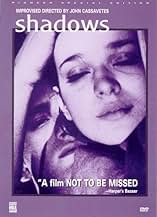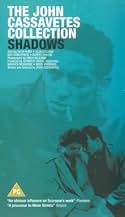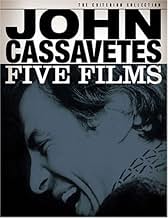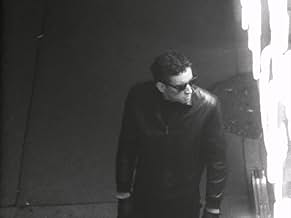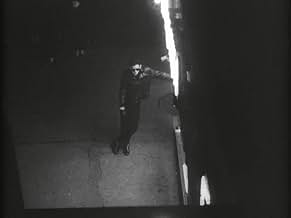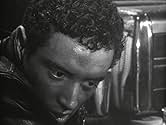Shadows
- 1958
- Tous publics
- 1h 21min
NOTE IMDb
7,2/10
13 k
MA NOTE
Dans le New York des années 50, le film d'improvisation jazz de Cassavetes explore les amitiés et les relations interraciales au sein de la Beat Generation.Dans le New York des années 50, le film d'improvisation jazz de Cassavetes explore les amitiés et les relations interraciales au sein de la Beat Generation.Dans le New York des années 50, le film d'improvisation jazz de Cassavetes explore les amitiés et les relations interraciales au sein de la Beat Generation.
- Réalisation
- Scénario
- Casting principal
- Nomination aux 4 BAFTA Awards
- 2 victoires et 5 nominations au total
David Jones
- Davey
- (as Davey Jones)
Avis à la une
1959 was a landmark in the world of film. Several great directors of the classic era were releasing career capping classics that ranked among their best. Just a look at the titles is instructive, Hitchcock's North By Northwest, Billy Wilder's Some Like It Hot, Howard Hawks' Rio Bravo, Douglas Sirk's Imitation of Life. Add a couple from the previous year, Orson Welles' Touch of Evil, Hitch's Vertigo, and Nick Ray's Wind Across the Everglades, and you've got a pretty good summing up of what was possible within the classic Hollywood style.
At the same time, two films appeared that hinted at a whole new way of making films. One was Jean-Luc Godard's Breathless, the other was John Cassavetes Shadows. The two films had certain things in common, largely improvised acting by non stars, handheld cameras, low budgets, and a certain youthful, jazzy swagger. In certain ways, though, they couldn't be farther apart. Godard was still a believer in the director as arbiter of style. He knew more about film than most Hollywood producers, and Breathless was filled with the iconography of the classic crime film. Cassavetes, on the other hand, was an actor, and a refugee from New York's underground theater scene. His first film shows him little impressed with the cinema, and a big believer in actors. Godard's film constantly references it's own artifice, whereas Shadows aims for a certain kind of naturalism.
It doesn't reach it, mainly because naturalism is a myth, particularly in cinema. But it feels powerful, kinetic but lilting like the cool jazz on the score, certainly the main inspiration for the filmmaking style on display here. It ultimately doesn't hold together, mainly because Cassavetes' actors here are amateurish beatniks, where Cassavetes style requires strong, imaginative actors. His later work with Gena Rowlands, Ben Gazarra, and Peter Falk blows this out of the water. Due to the director's technical inexperience, some bits of dialogue had to be redubbed later, which defeats the freshness of the improvisation. Still it's fascinating to watch, both for the great moments (like the scene where Leila Goldoni talks about her dissapointment with losing her virginity) and to watch a groundbreaking artist finding his way.
At the same time, two films appeared that hinted at a whole new way of making films. One was Jean-Luc Godard's Breathless, the other was John Cassavetes Shadows. The two films had certain things in common, largely improvised acting by non stars, handheld cameras, low budgets, and a certain youthful, jazzy swagger. In certain ways, though, they couldn't be farther apart. Godard was still a believer in the director as arbiter of style. He knew more about film than most Hollywood producers, and Breathless was filled with the iconography of the classic crime film. Cassavetes, on the other hand, was an actor, and a refugee from New York's underground theater scene. His first film shows him little impressed with the cinema, and a big believer in actors. Godard's film constantly references it's own artifice, whereas Shadows aims for a certain kind of naturalism.
It doesn't reach it, mainly because naturalism is a myth, particularly in cinema. But it feels powerful, kinetic but lilting like the cool jazz on the score, certainly the main inspiration for the filmmaking style on display here. It ultimately doesn't hold together, mainly because Cassavetes' actors here are amateurish beatniks, where Cassavetes style requires strong, imaginative actors. His later work with Gena Rowlands, Ben Gazarra, and Peter Falk blows this out of the water. Due to the director's technical inexperience, some bits of dialogue had to be redubbed later, which defeats the freshness of the improvisation. Still it's fascinating to watch, both for the great moments (like the scene where Leila Goldoni talks about her dissapointment with losing her virginity) and to watch a groundbreaking artist finding his way.
Shadows breathes the smell of New York's streets like no film before it. This kick off of Cassavetes' directorial work is as atmospheric as political and the initial spark for a renewal in American cinema.
Maybe it solicits for watching Cassavetes' first work in a double feature with another debut, Godard's À bout de soufflé. Both films shaped the cinematic production of their countries beyond decades and both breathe a peculiar lightness and jauntiness which was later rarely achieved by those filmmakers in their career.
Shadows tells from three Afro-American siblings, Ben (Ben Carruthers), Lelia (Lelia Goldoni) and Hugh (Hugh Hurd). The story is set in the New York jazz milieu and the driving rhythms on the soundtrack play a main part for the feverish, sometimes almost dreamlike atmosphere which draws through the entire film. There's not much happening in the plot. The everyday life of the three siblings is defined by problems in love relationship or in their jobs, but on both levels normality deceives. Without moralizing gestus, Cassavetes simply describes the mechanism of racial exclusion, in public and in private life. It was, regarding to the cinematic depiction of racism, a breakthrough film in the US.
This film owes also a lot to the performances of the three leading actors which were all almost completely unknown before. Especially Ben Carruthers established with his energetic portrayal the image of a new self-conception of young, urban blacks in America, an image which characterizes Spike Lee's films of the 80s and 90s. Revealingly, none of those three doubtlessly extremely talented actors was able to start a big career afterwards. Hollywood wasn't and isn't ready to ethnically expand its star system, and that is why Goldoni, Hurd and Carruthers only found small artistic niches in TV and independent films later on.
Perhaps Shadows is one of the less "beautiful" films ever shot, and one of the most beautiful ones at the same time; a film of shades and spaces, with a camera that merely watches the stream of life in the crowded street corners, bars, hotel lobbies, apartments, inducing an intriguing ramble through New York's vibrant streets.
Maybe it solicits for watching Cassavetes' first work in a double feature with another debut, Godard's À bout de soufflé. Both films shaped the cinematic production of their countries beyond decades and both breathe a peculiar lightness and jauntiness which was later rarely achieved by those filmmakers in their career.
Shadows tells from three Afro-American siblings, Ben (Ben Carruthers), Lelia (Lelia Goldoni) and Hugh (Hugh Hurd). The story is set in the New York jazz milieu and the driving rhythms on the soundtrack play a main part for the feverish, sometimes almost dreamlike atmosphere which draws through the entire film. There's not much happening in the plot. The everyday life of the three siblings is defined by problems in love relationship or in their jobs, but on both levels normality deceives. Without moralizing gestus, Cassavetes simply describes the mechanism of racial exclusion, in public and in private life. It was, regarding to the cinematic depiction of racism, a breakthrough film in the US.
This film owes also a lot to the performances of the three leading actors which were all almost completely unknown before. Especially Ben Carruthers established with his energetic portrayal the image of a new self-conception of young, urban blacks in America, an image which characterizes Spike Lee's films of the 80s and 90s. Revealingly, none of those three doubtlessly extremely talented actors was able to start a big career afterwards. Hollywood wasn't and isn't ready to ethnically expand its star system, and that is why Goldoni, Hurd and Carruthers only found small artistic niches in TV and independent films later on.
Perhaps Shadows is one of the less "beautiful" films ever shot, and one of the most beautiful ones at the same time; a film of shades and spaces, with a camera that merely watches the stream of life in the crowded street corners, bars, hotel lobbies, apartments, inducing an intriguing ramble through New York's vibrant streets.
This is the 3rd Cassavetes film I've watched and by far the most riveting -- and I can't tell you why. I realize there's a "debate" about it being improv. or not - but it doesn't matter. There is more honesty in this film (racial and otherwise) than in many others with far higher budgets. I was mesmerized thru the whole thing. New York in the early 60's is a sight to behold, but it's only the perfect backdrop to this film. It's the kind of art that you realize can only be done once. And this was it. The scenes at the MET with the Henry Moore sculptures and others underscored this for me. The movie was made once. The "score" was perfection. There can be no sequel, thank God. This is why film is considered an art form.
In the end credits of "Shadows", after we read 'directed by John Cassavetes', some white letters on the screen can be seen: "The film you have just seen is improvised", they say. I am always pursuing the fact that words are so important in movies since filmmakers started using them because, basically, there's no film without a screenplay and many other reasons.
Cassavetes pursued the same goal, and he believed in the freedom of words; "Shadows" is the perfect example. It's a film with no real main characters, with no real main plot lines; it's mostly people in different situations, talking. Yes, some of the situations are connected but Cassavetes, apparently always in a rush to get to the talking, uses a fast forward technique when the characters are going somewhere or escaping from someone and are not speaking.
Appearances are everything in this movie. For example, there's a brilliant score, full of jazz influences and a lot of fantastic solos, and there's one character that says he's a jazz musician and plays the trumpet (Ben, all the characters' names are the same names the actors'). However, we never see him play the trumpet or jam with a band; he doesn't even talk about music and just wanders with his friends around the city. They do talk, a lot, and about anything that's in their minds; going from how intelligent each of them are to the hilarious analysis of a sculpture.
"Shadows" is funny in its intellectual references in parts like the one above, because these friends are not cultured. The only important female character in the film (Lelia), though, wants to be an intellectual. But again, she has one very interesting conversation with an older man at a party, about a book she's trying to write, and about how to confront reality; but nothing to do with being intellectual. At that same party, a woman is actually making an intellectual statement, full of complexity, and asks a guy beside her: "Do you agree?". "Yes", he says, but you can tell he doesn't know what she's talking about.
Another character, a singer (Hugh), talks about his glory days in occasions, and we see him perform only once; but no references to the musical industry there. The focus of Cassavetes is the singer's relationship with his manager (Rupert), which most of the time involves chats about trivial stuff and not real 'musical' talks. So the trumpet player's important deal in "Shadows" is the time he spends with his friends; the intellectual wannabe girl's is her way of handling romantic relationships (one of the movie's strong points) and the singer's is the bond with his manager Appearances.
The reason why performances are not important in this movie is simple. Cassavetes needed people who could master improvisation, without mattering if they were actually good. I believe some of them aren't, but they surely know how to improvise in a scene, and you can notice how well they do it. "Shadows" is not about performers; it's about a way of making cinema, based on the magic of conversation; and there you could say that performances mean something.
That's why in every conversation the camera is like a stalker, constantly on the eyes of every character, constantly looking for the expressions that come with natural speech. There's a scene where the trumpet player and his friends are trying to pick up some girls. They are three, so each of them sits beside one girl (the girls are three two) in three different tables. They all talk at the same time and the camera shoots through the table, and sometimes the friends look at each other, while they say whatever they are saying It's natural.
Cassavetes pursued the same goal, and he believed in the freedom of words; "Shadows" is the perfect example. It's a film with no real main characters, with no real main plot lines; it's mostly people in different situations, talking. Yes, some of the situations are connected but Cassavetes, apparently always in a rush to get to the talking, uses a fast forward technique when the characters are going somewhere or escaping from someone and are not speaking.
Appearances are everything in this movie. For example, there's a brilliant score, full of jazz influences and a lot of fantastic solos, and there's one character that says he's a jazz musician and plays the trumpet (Ben, all the characters' names are the same names the actors'). However, we never see him play the trumpet or jam with a band; he doesn't even talk about music and just wanders with his friends around the city. They do talk, a lot, and about anything that's in their minds; going from how intelligent each of them are to the hilarious analysis of a sculpture.
"Shadows" is funny in its intellectual references in parts like the one above, because these friends are not cultured. The only important female character in the film (Lelia), though, wants to be an intellectual. But again, she has one very interesting conversation with an older man at a party, about a book she's trying to write, and about how to confront reality; but nothing to do with being intellectual. At that same party, a woman is actually making an intellectual statement, full of complexity, and asks a guy beside her: "Do you agree?". "Yes", he says, but you can tell he doesn't know what she's talking about.
Another character, a singer (Hugh), talks about his glory days in occasions, and we see him perform only once; but no references to the musical industry there. The focus of Cassavetes is the singer's relationship with his manager (Rupert), which most of the time involves chats about trivial stuff and not real 'musical' talks. So the trumpet player's important deal in "Shadows" is the time he spends with his friends; the intellectual wannabe girl's is her way of handling romantic relationships (one of the movie's strong points) and the singer's is the bond with his manager Appearances.
The reason why performances are not important in this movie is simple. Cassavetes needed people who could master improvisation, without mattering if they were actually good. I believe some of them aren't, but they surely know how to improvise in a scene, and you can notice how well they do it. "Shadows" is not about performers; it's about a way of making cinema, based on the magic of conversation; and there you could say that performances mean something.
That's why in every conversation the camera is like a stalker, constantly on the eyes of every character, constantly looking for the expressions that come with natural speech. There's a scene where the trumpet player and his friends are trying to pick up some girls. They are three, so each of them sits beside one girl (the girls are three two) in three different tables. They all talk at the same time and the camera shoots through the table, and sometimes the friends look at each other, while they say whatever they are saying It's natural.
No need to repeat what little plot there is.
In 1959, movie-making was a closed shop. Between the studios, the craft unions, and the distributors, the only films outside Hollywood were home movies. Add a restrictive Production Code to that shop, and you get a commercial product that's typically slick, entertaining, but all too predictable.
I remember being on a mid-western campus at the time and hearing about Shadows. An independent production gave me ideas that fortunately or unfortunately never materialized. But for many others, the idea took root and, most importantly, helped shake loose the Hollywood monopoly.
No, Shadows is far from a masterpiece by any standard. It is, however, a gutsy, pioneering effort that achieves its own brand of sensibility—it's certainly not slick; then too, it's more interesting than entertaining, and not at all predictable. In short, what's on Cassavetes's screen is largely in contrast to what we expected from feature films of the time.
Instead of conventional story or plot, there are several very loose narrative threads. Instead of prepared script, set, and cast, there are non-professionals and improvisation, though how much, I gather, is debatable. And in place of expected resolutions at movie's end, life simply continues much as it did before.
As a result, there's no expected moral or lesson to events. They simply happen as they happen, but within that framework, new possibilities open up, while the screen comes to look more like everyday experience than an entertainment medium. I gather the aim is to reveal truths at a new level left undisclosed by traditional narrative structure. Something like the 'truth of the moment as it's lived'.
This is certainly no place to attempt a concept like that. However, I can see how movie tradition with its emphasis on structure and artifice would override the momentary and the non-preconceived in favor of the integrity of the whole. So, it looks like Cassavetes not only helped establish the indie, but also aimed at a new way of looking at movies in general.
Anyway, I don't know how well he succeeds with Shadows. However, I do have a lasting image of New York City, that is, of the shabbily gaunt Ben Carruthers hunched down in his leather jacket, perhaps as protection against an uncaring world as he drifts aimlessly down the city street. I'm just sorry that Shadows didn't make it to my long ago campus.
In 1959, movie-making was a closed shop. Between the studios, the craft unions, and the distributors, the only films outside Hollywood were home movies. Add a restrictive Production Code to that shop, and you get a commercial product that's typically slick, entertaining, but all too predictable.
I remember being on a mid-western campus at the time and hearing about Shadows. An independent production gave me ideas that fortunately or unfortunately never materialized. But for many others, the idea took root and, most importantly, helped shake loose the Hollywood monopoly.
No, Shadows is far from a masterpiece by any standard. It is, however, a gutsy, pioneering effort that achieves its own brand of sensibility—it's certainly not slick; then too, it's more interesting than entertaining, and not at all predictable. In short, what's on Cassavetes's screen is largely in contrast to what we expected from feature films of the time.
Instead of conventional story or plot, there are several very loose narrative threads. Instead of prepared script, set, and cast, there are non-professionals and improvisation, though how much, I gather, is debatable. And in place of expected resolutions at movie's end, life simply continues much as it did before.
As a result, there's no expected moral or lesson to events. They simply happen as they happen, but within that framework, new possibilities open up, while the screen comes to look more like everyday experience than an entertainment medium. I gather the aim is to reveal truths at a new level left undisclosed by traditional narrative structure. Something like the 'truth of the moment as it's lived'.
This is certainly no place to attempt a concept like that. However, I can see how movie tradition with its emphasis on structure and artifice would override the momentary and the non-preconceived in favor of the integrity of the whole. So, it looks like Cassavetes not only helped establish the indie, but also aimed at a new way of looking at movies in general.
Anyway, I don't know how well he succeeds with Shadows. However, I do have a lasting image of New York City, that is, of the shabbily gaunt Ben Carruthers hunched down in his leather jacket, perhaps as protection against an uncaring world as he drifts aimlessly down the city street. I'm just sorry that Shadows didn't make it to my long ago campus.
Le saviez-vous
- AnecdotesThis caused a stir as it fairly explicitly showed an unmarried couple in a post-coital position and its suggestion that a young woman would actively seek out sex.
- GaffesWhen Tony takes Lelia back to her apartment, Ben, Dennis, and Tom are sitting around the table playing poker and trying to arranges some dates. All three bear the marks of a fight that won't take place until near the end of the movie.
- Crédits fous"Presented by Jean Shepherd's Night People"
- Versions alternativesCassavetes screened a finished version of Shadows in 1957 and 1958 that ran 78 minutes. Part of the original negative of this version was used for the 1959 version, which was completely re-shot with new actors. In 2002, Prof. Ray Carney of Boston University discovered the only remaining 16mm copy of this earlier version.
- ConnexionsFeatured in Cinéastes de notre temps: John Cassavetes (1969)
- Bandes originalesBeautiful
Written by Jack Ackerman, Hunt Stevens and Eleanor Winters
Meilleurs choix
Connectez-vous pour évaluer et suivre la liste de favoris afin de recevoir des recommandations personnalisées
- How long is Shadows?Alimenté par Alexa
Détails
Box-office
- Budget
- 40 000 $US (estimé)
- Montant brut mondial
- 2 729 $US
- Durée
- 1h 21min(81 min)
- Couleur
- Mixage
- Rapport de forme
- 1.37 : 1
Contribuer à cette page
Suggérer une modification ou ajouter du contenu manquant




